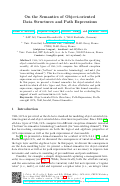On the Semantics of Object-oriented Data Structures and Path Expressions
Achim D. Brucker, Delphine Longuet, Frédéric Tuong und Burkhart Wolff
 UML/OCL is perceived as the de-facto standard for specifying object-oriented models in general and data models in particular. Since recently, all data types of UML/OCL comprise two different exception elements: inlineoclinvalid ("bottom" in semantics terminology) and inlineoclnull (for "non-existing element"). This has far-reaching consequences on both the logical and algebraic properties of OCL expressions as well as the path expressions over object-oriented data structures, ie, class models.
UML/OCL is perceived as the de-facto standard for specifying object-oriented models in general and data models in particular. Since recently, all data types of UML/OCL comprise two different exception elements: inlineoclinvalid ("bottom" in semantics terminology) and inlineoclnull (for "non-existing element"). This has far-reaching consequences on both the logical and algebraic properties of OCL expressions as well as the path expressions over object-oriented data structures, ie, class models.
In this paper, we present a formal semantics for object-oriented data models in which all data types and, thus, all class attributes and path expressions, support inlineoclinvalid and inlineoclnull. Based on this formal semantics, we present a set of OCL test cases that can be used for evaluating the support of inlineoclnull and inlineoclinvalid in OCL tools.
Schlüsselwörter: Object-oriented Data Structures, Path Expressions, Featherweight OCL, Null, Invalid, Formal Semantics
Kategorien: ,
Dokumente: (Artikel als PDF Datei) (Extended Version)
 Bitte zitieren sie diesen Artikel wie folgt:
Bitte zitieren sie diesen Artikel wie folgt:
Achim D. Brucker, Delphine Longuet, Frédéric Tuong und Burkhart Wolff.
On the Semantics of Object-oriented Data Structures and Path Expressions.
In Proceedings of the MODELS 2013 OCL Workshop (OCL 2013). CEUR Workshop Proceedings, 1092, pages 23-32, CEUR-WS.org, 2013. An extended version of this paper is available as LRI Technical Report 1565.
Schlüsselwörter: Object-oriented Data Structures, Path Expressions, Featherweight OCL, Null, Invalid, Formal Semantics
(Artikel als PDF Datei) (Extended Version) (BibTeX) (Endnote) (RIS) (Word) (
 )
)
| abstract | = | {\UML/\OCL is perceived as the de-facto standard for specifying object-oriented models in general and data models in particular. Since recently, all data types of \UML/\OCL comprise two different exception elements: \inlineocl{invalid} (``bottom'' in semantics terminology) and \inlineocl{null} (for ``non-existing element''). This has far-reaching consequences on both the logical and algebraic properties of \OCL expressions as well as the path expressions over object-oriented data structures, \ie, class models.\\\\In this paper, we present a formal semantics for object-oriented data models in which all data types and, thus, all class attributes and path expressions, support \inlineocl{invalid} and \inlineocl{null}. Based on this formal semantics, we present a set of \OCL test cases that can be used for evaluating the support of \inlineocl{null} and \inlineocl{invalid} in \OCL tools.}, | |
| author | = | {Achim D. Brucker and Delphine Longuet and Fr{\'e}d{\'e}ric Tuong and Burkhart Wolff}, | |
| booktitle | = | {Proceedings of the MODELS 2013 OCL Workshop (OCL 2013)}, | |
| editor | = | {Jordi Cabot and Martin Gogolla and Istv{\'a}n R{\'a}th and Edward D. Willink}, | |
| ee | = | {http://ceur-ws.org/Vol-1092}, | |
| file | = | {https://www.brucker.ch/bibliography/download/2013/brucker.ea-path-expressions-2013-b.pdf}, | |
| filelabel | = | {Extended Version}, | |
| keywords | = | {Object-oriented Data Structures, Path Expressions, Featherweight OCL, Null, Invalid, Formal Semantics}, | |
| location | = | {Miami, USA}, | |
| note | = | {An extended version of this paper is available as LRI Technical Report 1565.}, | |
| pages | = | {23--32}, | |
| = | {https://www.brucker.ch/bibliography/download/2013/brucker.ea-path-expressions-2013.pdf}, | ||
| publisher | = | {CEUR-WS.org}, | |
| series | = | {CEUR Workshop Proceedings}, | |
| title | = | {On the Semantics of Object-oriented Data Structures and Path Expressions}, | |
| url | = | {https://www.brucker.ch/bibliography/abstract/brucker.ea-path-expressions-2013}, | |
| volume | = | {1092}, | |
| year | = | {2013}, |

